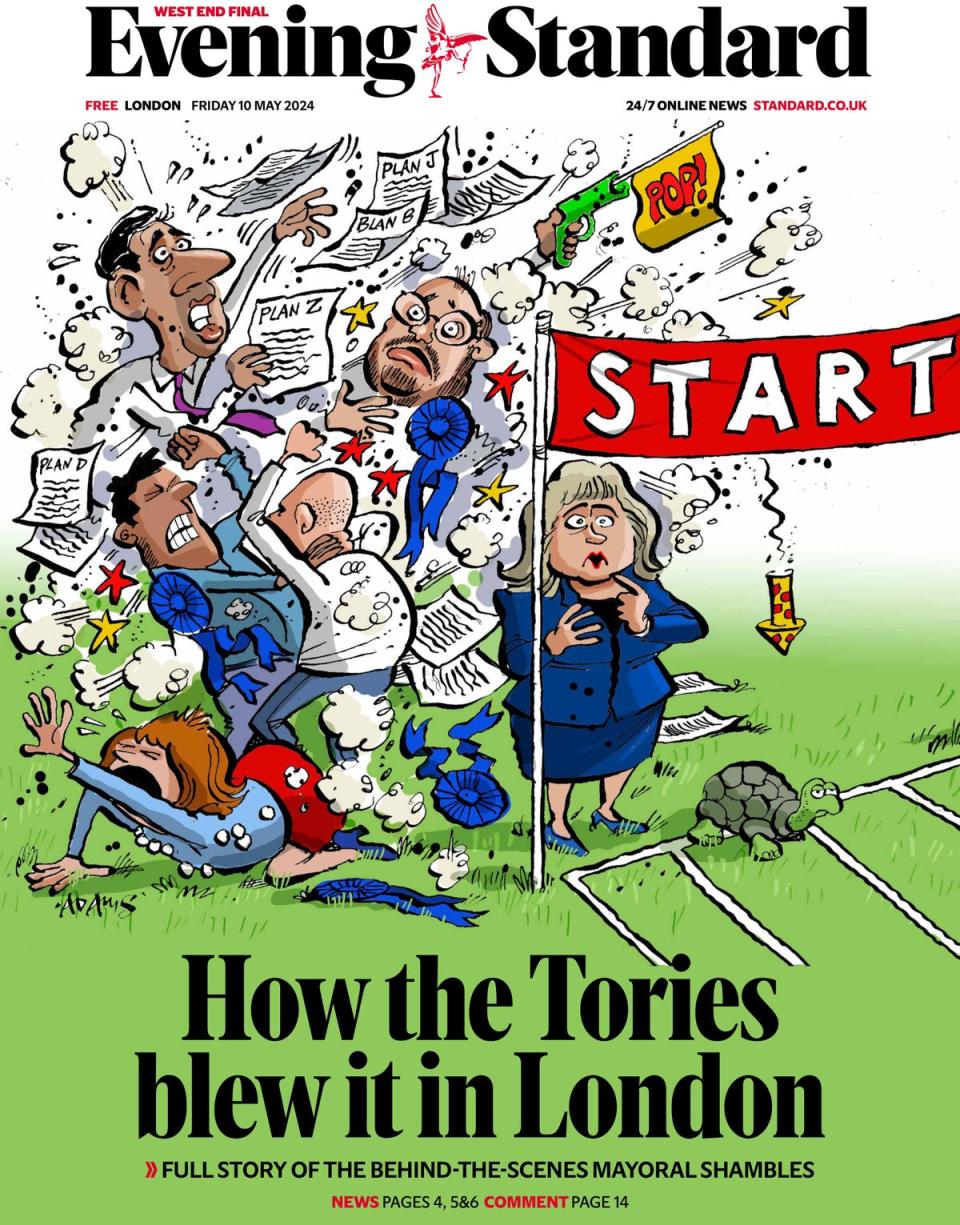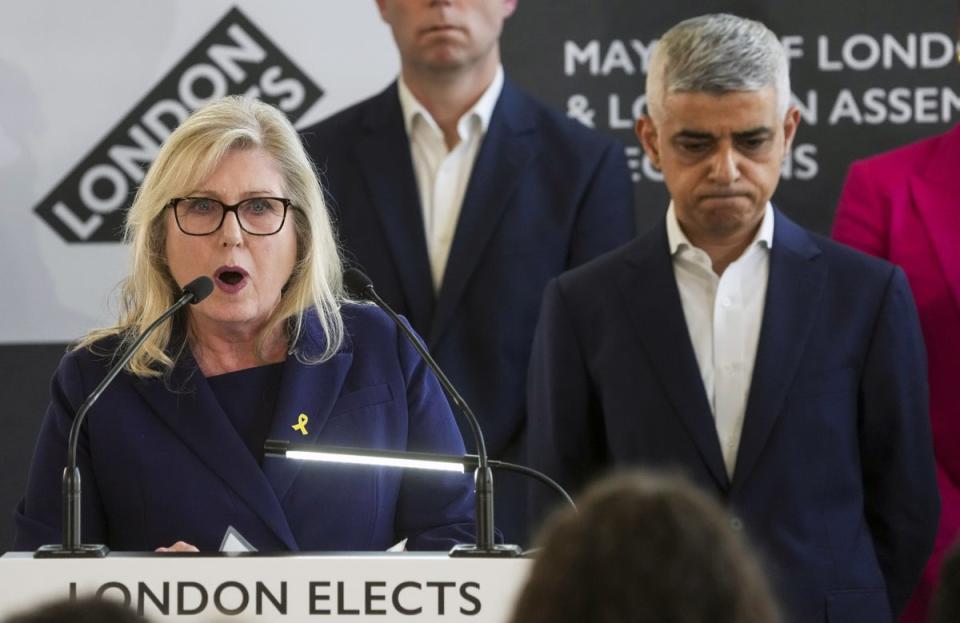Revealed: How the Tories blew the London mayoral election
The full story of how the Tories failed to stop Sadiq Khan from being re-elected can be revealed — with infighting, a bungled selection process and a lack of campaign funds blamed by insiders for derailing their efforts.
Despite suggestions of a close finish, Mr Khan beat his Conservative rival Susan Hall by more than 275,000 votes — with a swing of 3.2 per cent to Labour — to secure a historic third term as Mayor of London.
Tory party grandees and activists have admitted that a “negative” campaign, the lack of a “knockout” candidate and “ruthless” Labour targeting of Lib-Dem and Green voters made it impossible for Ms Hall to win. Other reasons included:
The lack of a positive message.
•Infighting among candidates vying for the Tory mayoral nomination.
•A lack of campaign funds for Ms Hall and a “late” manifesto.
• Amateur “party apparatchiks” put in charge of the shortlisting of candidates.
•The failure to include Tory MP Paul Scully on the shortlist.
•The decision not to restart the search for a mayoral candidate.
Making the Ulez central to Ms Hall’s campaign.
Ms Hall being selected despite some MPs believing she was not good enough.

Greg Hands, who as Tory party chairman oversaw the selection of Ms Hall last summer, told the Evening Standard: “The core problem was this: we had nobody as a knockout candidate who had put themselves forward. There wasn’t a standout candidate who wanted the job. There wasn’t a Boris or a Steve Norris.
“Everybody says, ‘Why don’t you go for a heavy-hitting personality, a celebrity or a business person?’ More often than not, there isn’t one who has come forward or responded positively. Susan Hall was a creditable candidate.”
Insiders criticised the “fruitless” search for a high-profile candidate. Rob Rinder, the lawyer-turned-TV-presenter, was approached indirectly. West Ham’s vice-chair and Apprentice star Baroness Brady ruled herself out.
One senior Tory admitted: “Celebrities don’t want to be elected politicians, and certainly not Conservatives.”
In 2007, the then Tory leader David Cameron pulled the plug on the party’s mayoral selection process, creating time for Boris Johnson to emerge. Some believe Rishi Sunak should have done the same last year.
But London Tory MPs such as Nickie Aiken and Gareth Bacon declined to run.
The selection panel “wanted someone who was not a typical politician”. But Mr Hands said: “The London board were wrong to have excluded Paul Scully.”
Brian Coleman, a former Tory chairman of the London Assembly, said the selection panel “screwed it up”. He said: “Sadiq was beatable but Susan wasn’t the candidate to do it.”
One campaigner said: “I like Susan but I’d only make her chairman of the cemeteries and crematorium committee. She was the worst candidate ever, worse than Shaun Bailey.”
One London Tory MP, asked if Ms Hall’s campaign was too negative, said: “Yes, absolutely.” The MP added: “I don’t think there was any need to remind Londoners how bad Sadiq Khan has been. It should have been more about: ‘There is an alternative.’ I think we had a chance with the right candidate.
“Susan was not the right candidate. But there was nobody with the political experience and nous who put their name forward.”
Ms Hall threw her hat into the ring last May, partly to “save face”, after being deposed as the Tory group leader on the London Assembly.
She defeated barrister Moz Hossain after former Downing Street aide Daniel Korski withdrew from the race.
Mr Korski pulled out in June after being accused of groping TV producer Daisy Goodwin. She alleged he groped her during a meeting at 10 Downing Street in 2013 when he was a special adviser there.
Mr Korski said he “categorically” denied the allegation but withdrew from the race because the pressure on his family and the “inability to get a hearing” for his message “made it impossible for my campaign to carry on”.
Mr Scully, despite being Minister for London at the time, was among those who failed to make the shortlist.
Ms Hall had initially come fourth in the first round of the shortlisting process, behind Mr Korski, Mr Hossain and Mr Scully.
With only three places available, there was a run-off between her and Mr Scully - with Ms Hall outperforming her better-known rival.
One source said: “We had three or four candidates very focused on taking pieces out of each other. All of them, or their surrogates, were running an active campaign against each other.
“Susan, to her credit, didn’t get involved in any of that stuff. Susan came up through the middle partly because she wasn’t associated with it.”
Her selection came a day before the Tories held Mr Johnson’s former seat of Uxbridge and South Ruislip in a by-election.
Axing the Ulez expansion became a key plank of Ms Hall’s campaign — wrongly in the eyes of many Tories. One MP said: “I don’t think it’s seen as an issue in central and inner London.”
Attic Rahman, a former member of the shortlisting panel, said: “Axing the Ulez expansion meant nothing to people in inner London. People didn’t want Sadiq Khan but they were not sure what they were going to get with Susan. We didn’t have a coherent message to get the public interested.”
Mr Coleman said: “It was an entirely negative campaign and Ulez wasn’t an issue for the vast majority of Londoners. No-one gives a toss other than white van man and Essex man, who doesn’t have a vote.”

Mr Khan increased the size of his vote, at a time many thought he was vulnerable. A Tory victory may have been impossible regardless of candidate, some activists said.
Ms Aiken, MP for the Cities of London and Westminster, said: “I take my hat off to Sadiq Khan’s team and their strategy of squeezing the Lib-Dem and Green vote, which proved very effective.”
Writing in The Spectator, Nick Rogers, who briefly considered seeking the mayoral nomination, said Ms Hall’s manifesto “contained almost nothing for the younger, professional voters the party absolutely needs to win over”.
Mr Scully told the BBC that the Tory campaign had been “underwhelming” and hadn’t “articulated any sense of vision”.
But one Hall activist hit back at “armchair commentators who have no clue”. He said: “Susan could not have done more work. People can joke and sneer about Susan all they want, but she was out there listening to Londoners.
“Sadiq squeezed the Green and Lib-Dem vote within an inch of their lives. He has done them over with the talk of a two-horse race. Labour were very effective in getting their vote out. That is how Sadiq Khan won.”
Andrew Boff, who was on the long-list of candidates and stood in for Ms Hall at several hustings, said: “She had a really good campaign. I don’t hold with this ‘negativity’ thing.”
He blamed the party’s unpopularity nationally for Ms Hall’s defeat. “People have been critical of the result. It was just the wrong time [to be a Tory mayoral candidate]. It’s not Susan to blame. The only people to blame are the national party.”
Nick Bowes, the former Khan aide turned political analyst, spotted that Ms Hall’s manifesto mentioned Mr Khan 18 times — four times more than her own name.
“It would be interesting to know how many voters were put off Hall by her repeated negative references to Khan,” he wrote on the OnLondon website. “He was nowhere near as unpopular as the Tories thought.”
Alex Georgiou, a key figure in Ms Hall’s campaign team and newly-elected London Assembly member, said: “She couldn’t have done any more. We are extremely proud of her. Khan got lucky this time. He will not get lucky next time.”
He added: “She was the best possible candidate for this election. She would have been an exceptional mayor.”
WAS VICTORY WITHIN SUSAN’S GRASP?
Ms Hall, in a video posted on Twitter/X, claimed victory had “so nearly” been within her grasp.
In fact, she lost by 275,000 votes and secured fewer votes – and a smaller share of the vote – than Shaun Bailey.
But Mr Hands said the party was more popular nationally when Mr Bailey - now Lord Bailey - ran to be mayor in 2021, winning the Hartlepool by-election on the same day and being about 15 points ahead in UK opinion polls, not 20 points behind Labour now.
“One might even argue that Susan outperformed the national picture,” Mr Hands said.
Across London. Ms Hall increased the Tory vote in Bexley and Bromley by almost 11,000 votes, was almost 20,000 votes ahead of Sadiq Khan in Croydon and Sutton and outpolled him by 7,000 votes in Brent and Harrow.
Aides said she also polled well in Greenwich, Merton, Dagenham and Redbridge. “If you look at the local election results nationally, and at the other ‘metro mayors’, Susan’s vote held up very well,” one said.
But Ms Hall’s 32.7 per cent share of the vote was the smallest achieved by a Tory mayoral candidate for 20 years.
Overall, there was a swing from Tory to Labour of 3.2 per cent. Mr Khan won by more than 90,000 votes in the North East constituency that includes Hackney and Waltham Forest, and by 70,000 in City and East, which includes Tower Hamlets and Newham.


